June 17, 2025 | 08:56 GMT +7
June 17, 2025 | 08:56 GMT +7
Hotline: 0913.378.918
June 17, 2025 | 08:56 GMT +7
Hotline: 0913.378.918
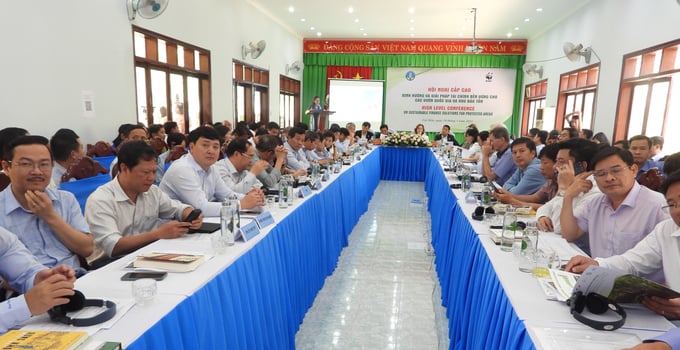
A high-level workshop was co-organized by the MARD and WWF on March 18. Photo: Tran Trung.
On March 18, the Ministry of Agriculture and Rural Development (MARD) coordinated with WWF to organize a high-level workshop on orientation and sustainable financial solutions for national parks and nature reserves.
The workshop welcomed the attendance of Minister of Agriculture and Rural Development Le Minh Hoan, Ms. Kirsten Shuijt, Director of the World Wide Fund for Nature (WWF) as well as leaders of provinces, representatives of the southern provinces’ Departments of Agriculture and Rural Development, leaders of national parks and nature reserves.
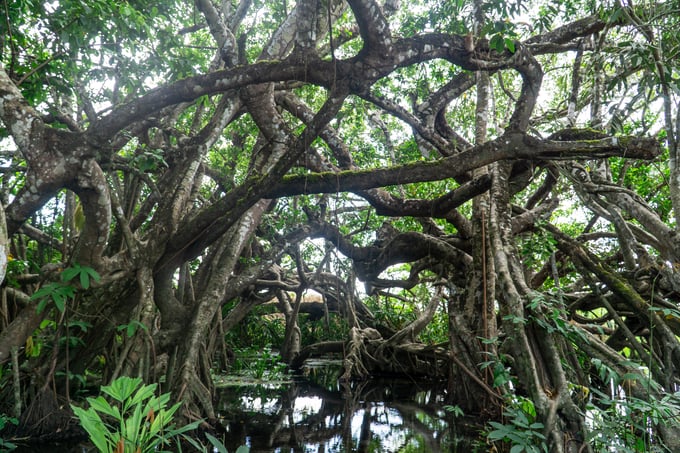
Vietnam’s special-use forest system is very diverse. Photo: NP.
According to the Department of Forestry, Vietnam has a special-use forest system with a total area of over 2.3 million ha, of which 34 national parks already occupy an area of more than 1.27 million ha.
The special-use forest system distributed throughout the country’s national parks is very diverse, from forest ecosystems on limestone mountains (Ba Be, Cat Ba, Cuc Phuong, Phong Nha - Ke Bang), low and medium altitude subtropical forest ecosystems (Hoang Lien, Chu Yang Sin, Kon Ka Kinh, Bidoup - Nui Ba), mixed ecosystems of forest and seas or islands (Bai Tu Long, Cat Ba, Con Dao, Nui Chua, Phu Quoc), to mangrove ecosystems (Xuan Thuy, Con Dao, U Minh Thuong, Ca Mau Cape, U Minh Ha).

The protection and preservation of ecosystems, biodiversity and their values are deemed urgent in the present and future. Photo: Tran Trung.
“The protection and preservation of ecosystems, biodiversity and their values are deemed urgent in the present and future. The Department of Forestry has advised to promulgate and organize the implementation of many important documents and policies. The goal is to continue conserving and sustainably developing the forest environment, using forests in association with natural resource conservation.
“Biodiversity conservation in our country is mainly carried out in national parks and nature reserves, where forests are being strictly protected according to the provisions of the law. There are currently many conservation activities that are proven to bring practical benefits to the wild ecosystem as well as the local community," said Mr. Tran Quang Bao, Director of the Department of Forestry.
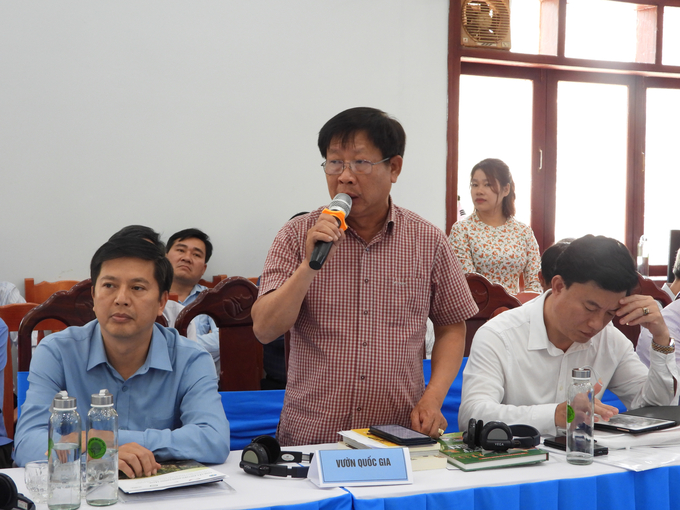
Representatives of national parks and protected areas shared opinions and gave out recommendations at the workshop. Photo: Tran Trung.
At the workshop, representatives of national parks and protected areas mentioned the shortcomings, difficulties and challenges, such as limited resources (human, finance, infrastructure), divided and vulnerable protection areas, too many levels of management leading to inefficiency, and lack of monitoring system. Climate change also causes the loss of a part of the forest area due to sea level rise, storms, or floods and the decline of ecosystems/species.
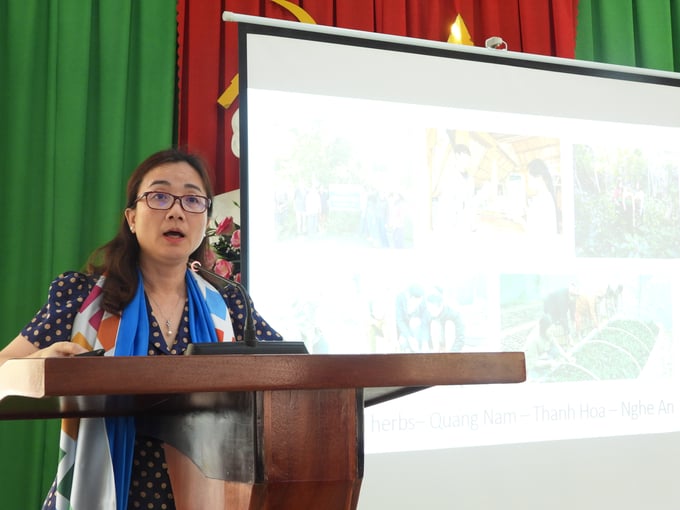
Many solutions were proposed at the workshop by experts to provide research methods and develop sustainable financial strategies for national parks and natural reserves. Photo: Tran Trung.
“It is clear that the conservation field is very demanding in terms of financial resources. Currently, having less than 1% of the total state budget invested in conservation, the resources for conservation are not adequate and have not met the demand. It is now considered urgent and essential to have more financial solutions, encourage the trial application of new financial mechanisms, and increase the mobilization of resources from international regions, the community, forestry and environmental services, or ecotourism,” said the experts at the workshop.
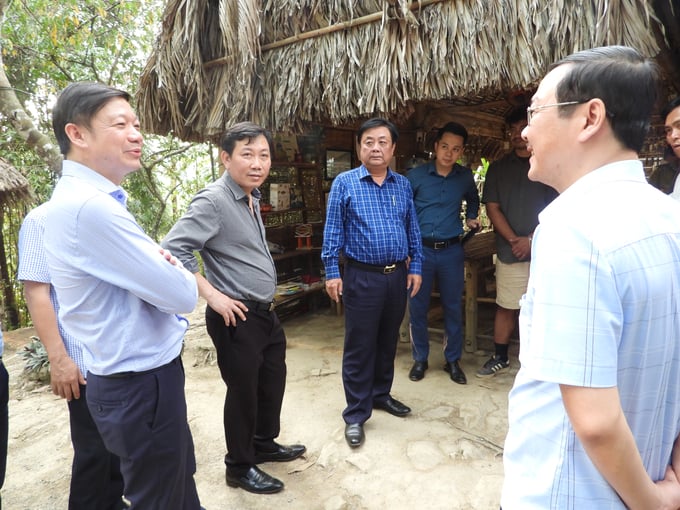
Minister of Agriculture and Rural Development Le Minh Hoan and the delegation paid a visit to the eco-tourism area in Cat Tien National Park. Photo: Tran Trung.
“We are well aware that, along with the increase in population, the area of natural forest is shrinking. That issue raises a question: Is it time for us to have a new vision and a new approach to develop the multi-use value of the forest ecosystem through the integration between economic science, technology science and social science?” Minister of Agriculture and Rural Development Le Minh Hoan said at the workshop.
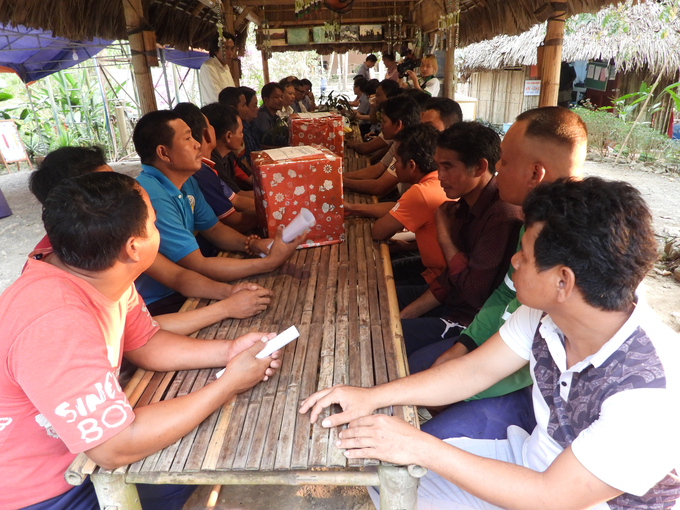
Minister Le Minh Hoan and the delegation visited indigenous communities that are participating in forest protection. Photo: Tran Trung.
In the same forest space, apart from wood, there are also rare medicinal herbs and food species with high nutritional value. Developing husbandry and aquaculture under the forest canopy is considered a possible option. The forest can also bring economic value through the rental of forest environment for ecotourism development or revenue from forest carbon credits.
Conservation is not only about biodiversity with rare fauna and flora, but the community knowledge and culture, spiritual space of human life also need to be preserved and developed in "a living museum" which is the forest space.
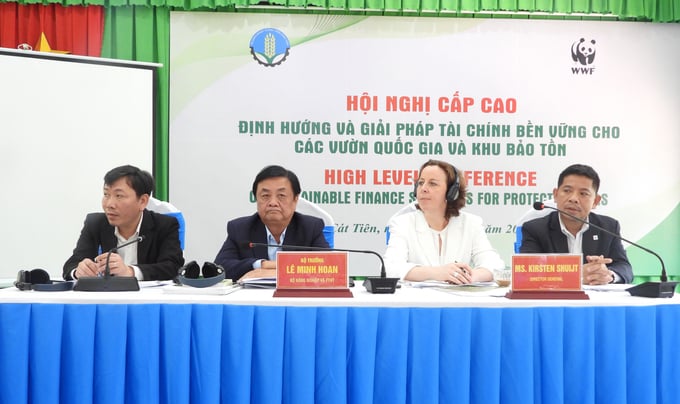
Minister of Agriculture and Rural Development Le Minh Hoan and leaders of the WWF and WWF-Vietnam chaired the workshop. Photo: Tran Trung.
“We have received many recommendations in this workshop, including solutions to mobilize resources from institutions, international financial funds and international partners such as WWF. The Ministry of Agriculture and Rural Development is ready to take the initiative and coordinate with international partners to jointly develop plans, guidelines and financial mobilization projects. The goal is to reduce the burden of public resource allocation and ensure sustainability plus the scale of financing for conservation. On this occasion, I call for the cooperation and focus of support from international partners, especially from international organizations with deep experience in this field such as WB, UNDP, and GIZ,” said Minister Le Minh Hoan.
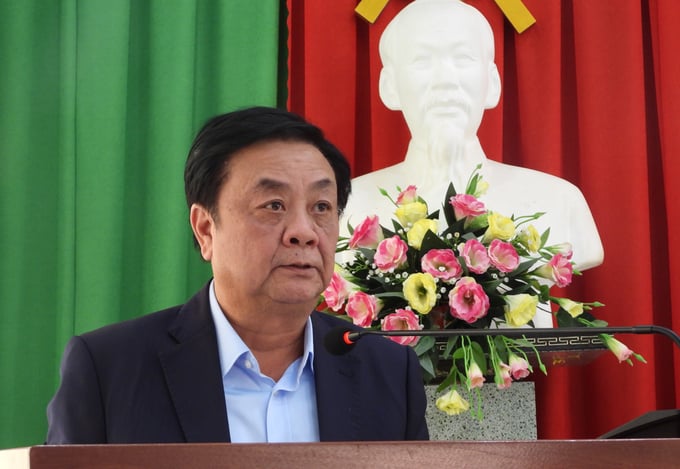
Minister Le Minh Hoan emphasized the importance of finding sustainable financial solutions for conservation at the workshop. Photo: Tran Trung.
The most stable and sustainable financial source for Vietnam at present is public investment, but it is only enough to pay for management staff in natural reserves that allow them to maintain a modest living standard while difficulties and disadvantages remain. Although the Government has been paying great attention to the forestry sector in general and conservation in particular, public financial resources also need to be allocated to other important priority sectors and sectors. Therefore, it is required to find sustainable financial solutions for conservation.
Translated by Samuel Pham
![Turning wind and rain into action: [4] Bringing climate bulletins to remote and isolated areas](https://t.ex-cdn.com/nongnghiepmoitruong.vn/608w/files/linhnhp/2025/06/14/1152-z6704423696987_15fd32ffc26d590d204d520c9dac6786-nongnghiep-151141.jpg)
(VAN) The Vietnam Agriculture and Nature Newspaper interviewed Mr. Vu Thai Truong, Acting Head of Climate Change and Environment at UNDP Vietnam, to gain deeper insight into how climate bulletins are delivered to farmers.

(VAN) In Tien Giang, a high-tech shrimp farm has developed a distinctive energy-saving farming model that has yielded promising results.
![Turning wind and rain into action: [3] 300.000 farmers benefit from agro-climatic bulletins](https://t.ex-cdn.com/nongnghiepmoitruong.vn/608w/files/news/2025/06/12/e5a48259d6a262fc3bb3-nongnghiep-125122.jpg)
(VAN) The agro-climatic bulletin has become a valuable tool for farmers in the Mekong Delta. After more than five years of implementation, the initiative is gradually being expanded nationwide.
![Turning wind and rain into action: [2] Providing forecasts to the people](https://t.ex-cdn.com/nongnghiepmoitruong.vn/608w/files/news/2025/06/12/e5a48259d6a262fc3bb3-nongnghiep-103927.jpg)
(VAN) In addition to improving the quality of hydrometeorological forecasts, putting forecast bulletins into practical use is crucial for production and disaster prevention.

(VAN) Blue carbon is receiving attention for its rapid absorption capacity and vast potential. It represents a promising nature-based solution to respond to climate change.
/2025/06/11/3507-1-161904_583.jpg)
(VAN) Seagrass beds and coral reefs serve as 'cradles' that nurture life in the ocean depths, creating rich aquatic resources in Vietnamese waters.
![Turning wind and rain into action: [1] Forecasting for farmers](https://t.ex-cdn.com/nongnghiepmoitruong.vn/608w/files/news/2025/06/11/e5a48259d6a262fc3bb3-nongnghiep-111919.jpg)
(VAN) Weather is no longer just a matter of fate. Forecasts have now become an essential companion for farmers in every crop season.